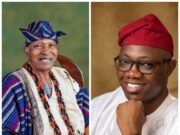A few days ago, I had a lively conversation with a community leader while the debate over local government autonomy was still raging, like an inferno across the country.
Oyo State Governor, Seyi Makinde had just added fuel to the conflagration of the discourse with his supposed ‘stakeholders’ meeting. Prior, he had described the ruling as a distraction from the socioeconomic reality in the land.
I intended to simply learn from history, understand the dynamics of local politics, and the underlying challenges that may undermine and frustrate the expected growth of local councils.
Admittedly, the old man told me that a truly autonomous local government would change the rural economy and foster growth and development in forgotten places.
He told me that in the past, local governments were powerful, resourceful, and influential tiers of government with the ability to award contracts, execute executive projects, and recruit workers. He said endemic corruption, mismanagement, and maladministration forced state governments across the country to devise a sustainable system for managing their funds and their personnel. “In the past,” he told me, “top hierarchies in councils, in addition to their local power brokers and collaborators, have a penchant for stupendously fabulous lives.
“Not only are they reckless and careless, but they often lack effectiveness as they undermine and frustrate ideas that could potentially impact the people and lift them out of poverty, rather than adding values to the system that funds their extravagant lifestyles.” He added that for us to understand the resistance of the state government, we need to take a short trip into the past when local governments were truly financially autonomous.
He explained further, “They used to say that action leads to reaction, so one thing led to another, and state governments whisked away the financial autonomy of local government areas.” He asserted that local councils with financial autonomy will revert grassroots politics to a state of fear, panic, and apprehension, as they will readily recruit thugs and touts to represent their employers and combat perceived adversaries.
Finally, he admitted that Makinde’s administration has not handled local government matters effectively, compared to the late former Governor Abiola Ajimobi, who gave the councils some modicum of freedom and autonomy in certain areas. He said the current state government’s highhandedness has not only stifled rural development but has also created an atmosphere of helplessness and hopelessness. “But I believe the times have changed for the better,” he added, “local government administration, which used to be invincible, is no longer hidden from people’s view.” I am confident that the younger generations will not tolerate the recurrence of past misdeeds by council handlers in the current administration.
Amid the noise and contention around local government autonomy, it was refreshing to listen to the impeccable perspective of the old man. He argued with facts and logic while sounding persuasive and convincing, a clear departure from Seyi Makinde’s position as governor. He knew the current local government arrangement has only benefited the unelected council chairmen, particularly those at Ibadan.
I agree with him on many of his submissions, particularly the one calling for cautious optimism among Nigerians after the Supreme Court landed a crushing blow on the state governments for their refusal and resistance to granting financial autonomy to local government areas.
Rather than spit fire and parrot narratives like the governor, that old man taught me that we can disagree on many issues without turning water into blood. Except we are vigilant and conscious of time and history, he said, financially autonomous local government areas may in the long run become the monster the people and apex court made.
In other words, Governor Makinde ought to have kept his cool instead of firing across all cylinders. Nigerians don’t need his intervention. He should chill and watch the public temperature. He has ruptured the conversation but that only alienated people away from him. For many in the state, Governor Makinde’s public utterances failed to reflect the wishes and aspirations of the rural people.
For them, any support for the continuation of the status quo is not only an anathema but antithetical and inimical to the growth and development of the people and their lands.
OYO101 is Muftau Gbadegesin’s opinion about issues affecting the Oyo state and is published every Saturday. He can be reached via @GbadeTheGreat on X, muftaugbadegesin@gmail.com, and 09065176850.



































